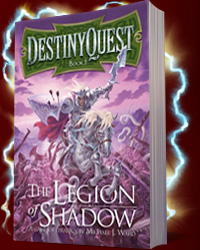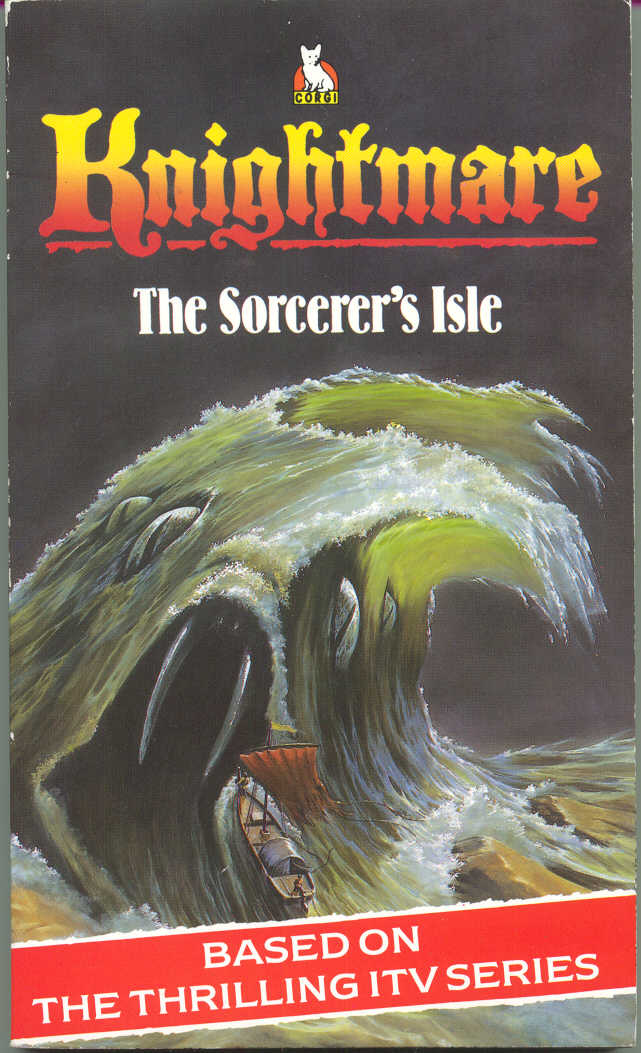Not having the winning ending on the final paragraph
In a lot of gamebooks, the final paragraph is the winning paragraph. However, people like me, who like to read the ending first, know exactly where to go to read the end and possibly get some clues on how to win. However, the winning paragraph could be any paragraph. If you are a complete sadist, you could have the final paragraph as a paragraph near the end which looks like a winning paragraph but you end up in the bottom of a pit, for example (There's a Fighting Fantasy book I'm talking about).
Don't have paragraphs that go in numerical order
The paragraphs in Outsider! are not numbered 1,2,3 etc. to prevent cheating. Also, some Tunnels and Trolls solos are numbered 1, 1a, 1b, 2, 2a, 2b etc. Each number is a different location in the book.
Maps with numbers
 |
| Stonemarten Village from Grailquest 2: Den of Dragons. |
You don't have to give people options in paragraphs. You could give them options in other ways such as with a map. This could be useful if you have a hub in a gamebook (a section where you have the option to go to many places and you return to it after your visit). Instead of having a list, you could have a map.
Maps can also give other information such as distance a place is from where you are, where the places are in relation to each other (which may be important for example, if you know that an army is invading from the west then you know that you will probably encounter it if you go west) and what the location will be like given its picture (for example, you know from the above image that you could go to a church).
Other gamebooks that use this method are The Scarlet Sorcerer by Joe Dever and Destiny Quest: The Legion of Shadow by Michael J. Ward.
Orphan paragraphs
There are some paragraphs in gamebooks that no other paragraph leads to. This is what ADVELH refers to as an orphan paragraph. They may be present for several reasons. Some may be fake paragraphs that are only there to flesh out the book (Warlock of Firetop Mountain has one of these as does Citadel of Chaos).
There are other reasons to have orphan paragraphs. You may have to turn to one when something happens (such as your honour reaching 0 in Sword of the Samurai) or if you decide to use an item and want to find out what it does (such as the healing potion in Battleblade warrior) or if you come across a wandering monster (such is in Warlock of Firetop Mountain).
These paragraphs are useful if there is something that could happen at any time in the book or an item that the hero cold use at any time in the book, but you do not want to tell the reader what the effects are straight away. The mysterious potion you find could be good or bad. It adds extra intrigue to the gamebook.
Secret paragraphs
There are some orphan paragraphs that you can get to, but you have to found out how. For this, you need to know two things. The first is when you can turn to the secret paragraph. The second is which paragraph you need to turn to. The simplest way to do this is to tell the player to turn to a paragraph when something happens or give them a numbered item.
Creature of Havoc has quite a few of these and for different reasons. In Creature of Havoc, you can turn to a secret paragraph if you find a pendant that detects secret doors. You know that you should turn to a new paragraph when you read the phrase 'You cannot see a thing'. You then subtract a number from the paragraph you are on to turn to the new number (the instructions then change later on and then something weird happens which may or may not be intentional).
Another occasion where you turn to secret paragraphs is if you pick up a companion. You are told that whenever you come across a paragraph number ending in 7, that you should subtract a number from the paragraph and turn to a new number.
There are more examples of secret paragraphs. In Demons of the Deep, the magic spell to make skeletons from black pearls is a number spelt backwards. In many books, there is the trick of converting a word into numbers using the formula A=1, B=2 C=3, etc. Some books have number puzzles where you have to turn to the answer.
Rebel Planet has an inventive use of the secret paragraph where you have to convert the binary access code to decimal. Crimson Tide also has a good use of a secret paragraph.
However, why use secret paragraphs? It is to stop the book from giving away too much.
For example, in Deathtrap Dungeon, towards the end, you are asked if you have an emerald. If you don't you lose. You know that you are at the last door, so you are in the right place. There are also no other options, so the conclusion is that you need an emerald for your success. This means that in your next playthrough, you know that you need to find an emerald and that you need to take a different route. You may have even seen an emerald and ignored it so you just need to make a small change to your route to win.
Now if you found an emerald and also got told that when you meet a small gnome, turn to x, then anyone who doesn't have an emerald will not find out that they needed one at the end. It makes the book more challenging, gives it more play time and it is more satisfying when you finally win.
Clues
You should know which gems you need in Battleblade Warrior. You should also be able to work out who the werewolf is in Stormslayer. Why? Because the art or the text gives you a clue. Basically, you have a choice in the book that appears arbitrary but if you read the text closely enough or examine a picture closely enough then you should be able to work out the answer. Clues allow you to draw disparate bits of information together to solve a seemingly insoluble problem.
Puzzles
Wheras with clues where you may or may not have the correct information to solve a problem, a puzzle does present you with the information you need and you need to work out what to do with it. There are loads of puzzles and riddles in gamebooks. One is the Space Assassin question - what comes next in this sequence OTTFFSSE?
Another one is in Curse of the Mummy where you are given the rules to a game which you play and you have to work out which piece to move to win.
It is difficult to make a puzzle challenging but not obtuse. I think The game in Curse of the Mummy works well as the rules are laid out clearly and you can use the information to work out the problem eventually. There are many other puzzles, however, where I think that I'm just trying to work out what the author was thinking and I've got no idea what they're getting at. When this happens, I just flick through the book, looking for a paragraph that looks like the answer (I'm looking at you, Tower of Destruction).
Orphan paragraphs
There are other reasons to have orphan paragraphs. You may have to turn to one when something happens (such as your honour reaching 0 in Sword of the Samurai) or if you decide to use an item and want to find out what it does (such as the healing potion in Battleblade warrior) or if you come across a wandering monster (such is in Warlock of Firetop Mountain).
These paragraphs are useful if there is something that could happen at any time in the book or an item that the hero cold use at any time in the book, but you do not want to tell the reader what the effects are straight away. The mysterious potion you find could be good or bad. It adds extra intrigue to the gamebook.
Secret paragraphs
 |
| Zharradon Marr is so evil he even makes his gamebooks diabolical. |
Creature of Havoc has quite a few of these and for different reasons. In Creature of Havoc, you can turn to a secret paragraph if you find a pendant that detects secret doors. You know that you should turn to a new paragraph when you read the phrase 'You cannot see a thing'. You then subtract a number from the paragraph you are on to turn to the new number (the instructions then change later on and then something weird happens which may or may not be intentional).
Another occasion where you turn to secret paragraphs is if you pick up a companion. You are told that whenever you come across a paragraph number ending in 7, that you should subtract a number from the paragraph and turn to a new number.
There are more examples of secret paragraphs. In Demons of the Deep, the magic spell to make skeletons from black pearls is a number spelt backwards. In many books, there is the trick of converting a word into numbers using the formula A=1, B=2 C=3, etc. Some books have number puzzles where you have to turn to the answer.
 |
| I'm going to tell you exactly what you need to win. |
Rebel Planet has an inventive use of the secret paragraph where you have to convert the binary access code to decimal. Crimson Tide also has a good use of a secret paragraph.
However, why use secret paragraphs? It is to stop the book from giving away too much.
For example, in Deathtrap Dungeon, towards the end, you are asked if you have an emerald. If you don't you lose. You know that you are at the last door, so you are in the right place. There are also no other options, so the conclusion is that you need an emerald for your success. This means that in your next playthrough, you know that you need to find an emerald and that you need to take a different route. You may have even seen an emerald and ignored it so you just need to make a small change to your route to win.
Now if you found an emerald and also got told that when you meet a small gnome, turn to x, then anyone who doesn't have an emerald will not find out that they needed one at the end. It makes the book more challenging, gives it more play time and it is more satisfying when you finally win.
Clues
 |
| Let the cat out of the bag. |
Puzzles
Wheras with clues where you may or may not have the correct information to solve a problem, a puzzle does present you with the information you need and you need to work out what to do with it. There are loads of puzzles and riddles in gamebooks. One is the Space Assassin question - what comes next in this sequence OTTFFSSE?
Another one is in Curse of the Mummy where you are given the rules to a game which you play and you have to work out which piece to move to win.
 |
| How do you get your black piece to the other end? |
Multiplayer gamebooks
There aren't many multiplayer gamebooks, but the ones that are around are quite varied. You have gamebooks where you cooperate as part of a group (Heroquest: The Fellowship of Four, Bloodsword) and gamebooks where you compete with another person (the Combat Heroes series and the Duelmaster series).
Gamebook serials
It's always good to have the same character in several gamebooks. You can watch them grow more powerful and get more achievements. This includes Lone Wolf (and spin offs), Fabled Lands and the Sorcery series.
Have an RPG system? Why not use it in a gamebook?
Tunnels and Trolls has several solo adventures. Maelstrom also has a solo adventure to demonstrate its mechanics to GMs. Gamebooks can be good to use as demos for RPG systems or you can just use the RPG system in the gamebook just to make a gamebook.
On the other end, if you have a gamebook, you can turn it into an RPG like Fighting Fantasy, Lone Wolf and Fabled Lands. This gives you a chance to expand the system as most gamebook systems are more simple than RPG systems (or maybe you don't want to make it more complicated and just have a quick and entertaining play through).
Have a moral system in gamebooks
Some gamebooks encourage certain actions and moral points of view. For example, Tower of Destruction, Knightmare: The Sorcerer's Isle and Sword of the Samurai.
Break the fourth wall
This generally happens in a death paragraph when the author is telling you what an idiot you've been. Grailquest does it quite a lot. It is a different way of addressing the reader.
Vehicles
These mainly pop up in scifi gamebooks - as well as tracking the stats for your character, you also have a spaceship, a cool car or a giant robot to track stats for. You normally have stats for these because you get into battles with them, which is pretty cool. You get your own vehicles in Starship Traveller, Robot Commando and Sky Lord.
Companions
You don't have to complete gamebooks alone either. You can write in companions for the hero. You could make the companions part of the story all of the way and if you lose them, you lose or you could have a companion with stats who may or may not die. This is harder to do, but a good way to do it is what Jonathan Green does in Stormslayer. He puts a star by a paragraph number and if you have a companion, you subtract a number from that paragraph number and turn to the new paragraph. Creature of Havoc makes it secret by saying that if you have a companion and you come to a paragraph ending in the number 7, then you turn to the new paragraph.
Vehicles
These mainly pop up in scifi gamebooks - as well as tracking the stats for your character, you also have a spaceship, a cool car or a giant robot to track stats for. You normally have stats for these because you get into battles with them, which is pretty cool. You get your own vehicles in Starship Traveller, Robot Commando and Sky Lord.
Companions
You don't have to complete gamebooks alone either. You can write in companions for the hero. You could make the companions part of the story all of the way and if you lose them, you lose or you could have a companion with stats who may or may not die. This is harder to do, but a good way to do it is what Jonathan Green does in Stormslayer. He puts a star by a paragraph number and if you have a companion, you subtract a number from that paragraph number and turn to the new paragraph. Creature of Havoc makes it secret by saying that if you have a companion and you come to a paragraph ending in the number 7, then you turn to the new paragraph.
So there are more ideas for our gamebooks. That's it for writing them. Once we have completed a first draft then it's good to read through the book to make sure it makes sense and playtest the system to make sure that it is fair. Then we can analyse how the gamebook went in order to make out next gamebook even better. That's what I'll be doing next week, where I will have three vlogs analysing gamebooks I have written.















